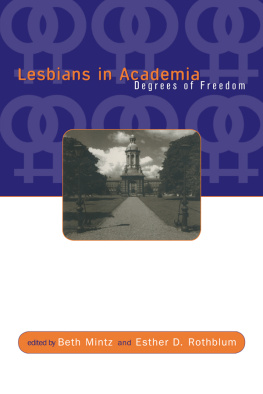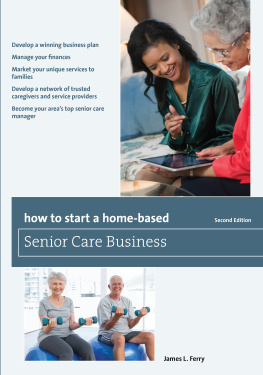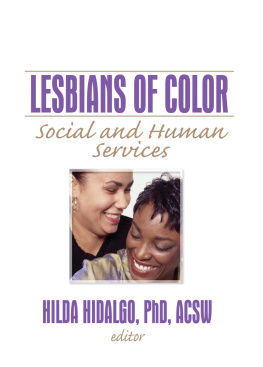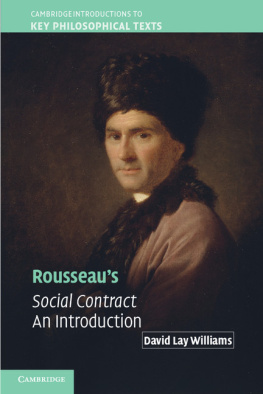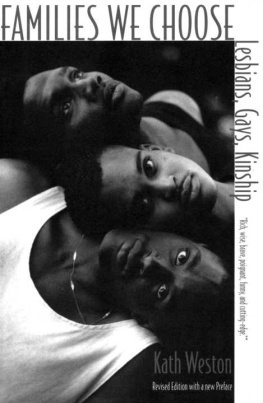Social Services for Senior Gay Men and Lesbians
Social Services for Senior Gay Men and Lesbians
Jean K. Quam, PhD
Editor
Social Services for Senior Gay Men and Lesbians has also been published as Journal of Gay & Lesbian Social Services, Volume 6, Number 1 1997.
1997 by The Haworth Press, Inc. All rights reserved. No part of this work may be reproduced or utilized in any form or by any means, electronic or mechanical, including photocopying, microfilm and recording, or by any information storage and retrieval system, without permission in writing from the publisher.
The development, preparation, and publication of this work has been undertaken with great care. However, the publisher, employees, editors, and agents of The Haworth Press and all imprints of The Haworth Press, Inc., including The Haworth Medical Press and Pharmaceutical Products Press, are not responsible for any errors contained herein or for consequences that may ensue from use of materials or information contained in this work. Opinions expressed by the author(s) are not necessarily those of The Haworth Press, Inc.
First published by
The Haworth Press, Inc., 10 Alice Street, Binghamton, NY 13904-1580 USA
This edition published 2012 by Routledge
Routledge
Taylor & Francis Group
711 Third Avenue
New York, NY 10017
Routledge
Taylor & Francis Group
27 Church Road, Hove
East Sussex BN3 2FA
Library of Congress Cataloging-in-Publication Data
Social services for senior gay men and lesbians/ Jean K. Quam, editor.
p. cm.
Includes bibliographical references and index.
ISBN 1-56024-808-4 (alk. paper). ISBN 1-56023-084-3 (pbk : alk. paper)
1. Social work with gaysUnited States. 2. Social work with the agedUnited States. 3. Aged gay menServices forUnited States. 4. Aged lesbiansServices forUnited States. I. Quam, Jean K. (Jean Kathleen)
HV1449.S65 1997
362.608664dc21
96-52129
CIP
ABOUT THE EDITOR
Jean K. Quam, MSW, PhD, is Professor and Director of the School of Social Work at the University of Minnesota in Minneapolis, where she has been a faculty member since 1980. Dr. Quam has presented papers on gay and lesbian aging and has also published numerous articles on this topic in journals such as The Gerontologist and Seicus Reports. In addition to gay and lesbian aging issues, her research interests include aging and mental health and older women.
CONTENTS
Phyllis Lyon
Del Martin
Arlene Kochman
Lisa J. Hamburger
John Yoakam
Pam Metz
Dennis V. Christian
Daniel A. Keefe
Gary S. Whitford
Jean K. Quam
Kevin Sitter
Beth McLeod
As the population of the nation grows older, so do gay, lesbian and bisexual people. Like most Americans, most lesbians, gays and bisexuals dont like to dwell on the facts of aging. As a result there has not been as much attention paid to the needs of our elders as there should be.
Senior Action in a Gay Environment (SAGE) in New York, the first agency to provide services for our elders, was founded in 1979 by a young lesbian gerontologist, Chris Almvig. Today, there are other groups around the country such as Gay and Lesbian Elders Active in Minnesota (GLEAM) in Minneapolis, another SAGE in San Diego with a slightly different name and no connection to the New York group, and Gay Lesbian Outreach to Elders (GLOE) in San Francisco. Considering the size of the gay/lesbian/bisexual population nationwide, we certainly lag behind in caring for those of us who are in our golden years. There are signs that new agencies are emerging, however slowly.
At the 1993 Creating Change Conference sponsored by the National Gay and Lesbian Task Force (NGLTF), members of Old Lesbians Organizing for Change (OLOC) and others held a day-long intensive workshop entitled Ageism/Age and Aging. Subsequent discussions with then NGLTF Executive Director Peri Jude Radecic brought about a pledge that NGLTF and OLOC would work closely together to confront and root out ageism in the lesbian and gay community. OLOC will conduct training for NGLTF staff and also for the staffs of other national gay/lesbian organizations. Further, NGLTF will hire an old lesbian or gay man as staff or as a consultant, and will produce and disseminate educational material on ageism, and include ageism workshops in all of its conferences.
The American Society on Aging (ASA) has become more sensitive. Recently, the Lesbian and Gay Aging Interest Network (LGAIN) was established which publishes a newsletter for members of ASA and LGAIN. LGAIN will educate service providers around heterosexism and homophobia while advocating for greater visibility for this population of underserved elders, both in the aging community and among gay and lesbian organizations. Thanks to the work of staffer Marcia Freedman, ASA has sponsored several conferences for service providers on the concerns of lesbians and gay men around aging and ageism.
We live in an ageist society. No community is immune and it is devastating when it occurs in your own community-the community for which you have fought against discrimination over several decades. When GLOE contacted Black and White Men Together to reach Black gay male seniors, the group said they knew of one man who was almost 60 and added, but we are nice to him anyway.
An OLOC brochure tackles ageism head on. It says it is ageist to consider young a compliment, old a derogatory synonym for ugly, decrepit, out-of-date; to automatically assume an Old Lesbian is asexual; to view an Old Lesbian as a burden or a role model rather than an equal with whom a reciprocal relationship is desirable; to speak/do for an Old Lesbian instead of letting her speak/do for herself, to assume she needs and wants your help.
Fernando Torres-Gil, Assistant Secretary for Aging in the Clinton administration, recently stated: In the end the future of aging is really about women in American society. Older women will ultimately benefit or pay the price for what we have done or what we do. Statistics indicate that the average life span of women is four years longer than men, and women now make up about 60% of persons age 65 and older. This may be one of the reasons that lesbians appear to be more involved in various aspects of aging than are gay menthere are simply more of us.
The experience of the San Francisco gay/lesbian communities over the years has been that we create our own institutions to safeguard our rights, validate our relationships and families, and provide support services, and then plug into the system. The San Francisco Tavern Guild supported the inception of Operation Concern, a gay/lesbian/bisexual mental health agency. Auctions, fundraising, and donations all supported the fledgling agency until it could connect with city funding and other more traditional sources of income. The same pattern was true for the Lyon-Martin Womens Health Services and the countless agencies which serve people with AIDS and/or who are HIV positive. GLOE came about because Carole Migden, currently a member of the San Francisco Board of Supervisors but in 1980 the Executive Director of Operation Concern, applied to the Commission on the Aging for funds to start a program for lesbian and gay elders and in 1982 got the funds to hire staff for GLOE.




